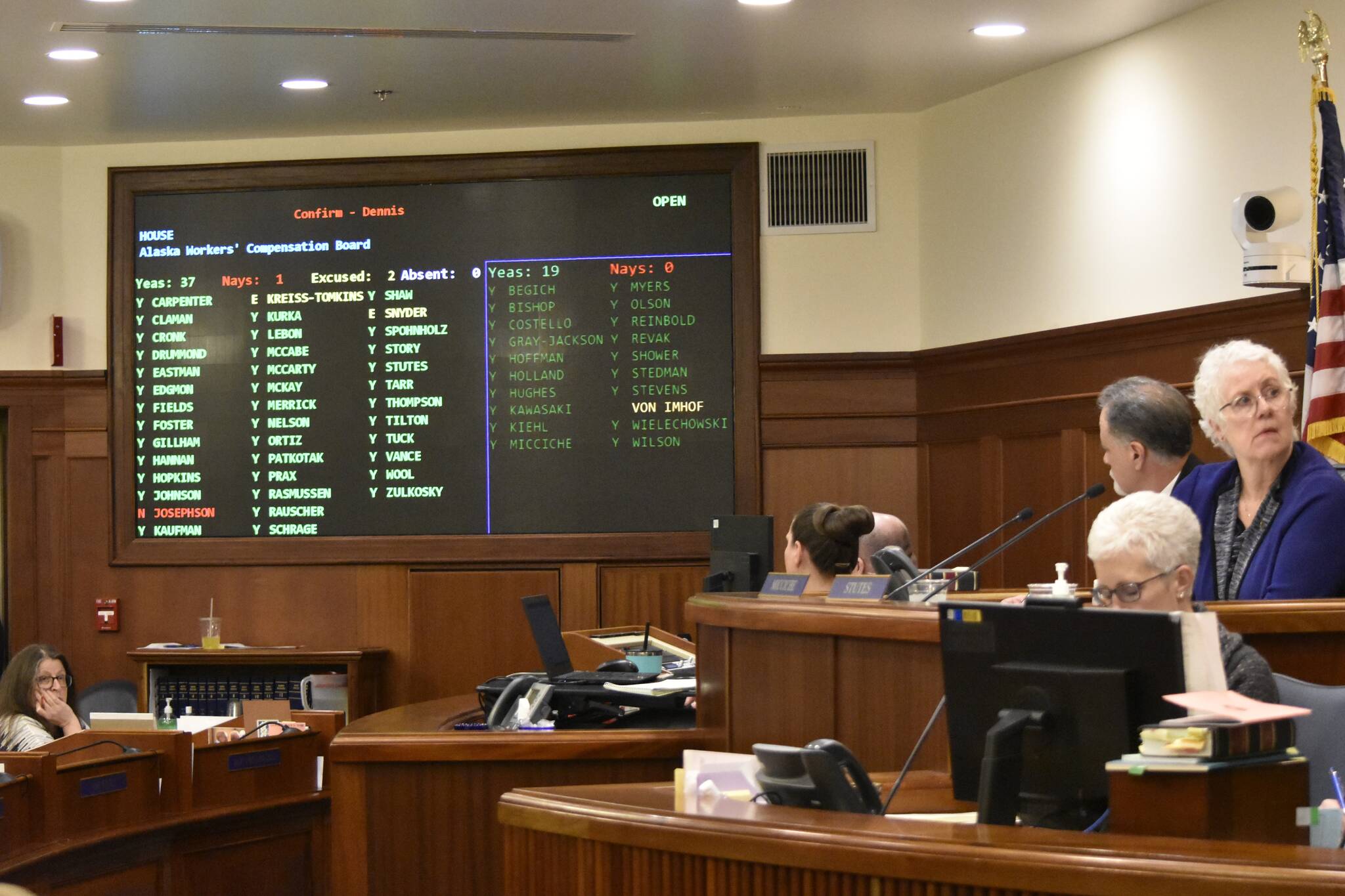The Alaska State Legislature approved all of Gov. Mike Dunleavy’s appointments to boards and commissions Wednesday, generally with little to no objection to nominees.
Lawmakers approved the confirmations in a joint session that lasted roughly two hours. Many of the nominees passed without objection or with only a handful of legislators objecting to the appointments.
The most divided vote was for Ramsey Bell of Eagle River to the Board of Pharmacy. Opponents to Bell’s confirmation said Bell’s comments regarding the use of Ivermectin to treat COVID-19 and other questionable medical practices disqualified Bell from the position.
Senate Minority Leader Tom Begich, D-Anchorage, read a letter from a former president of the pharmacy board critical of Bell’s social media posts and noted she had only worked as a pharmacist in Alaska for five years, the bare minimum to qualify for the board.
“I respect the idea of having diversity on this board,” Begich said, “With one exception; when it places public health at risk.”
Bell was confirmed by a narrow vote of 10-9 in the Senate, with Sens. Gary Stevens, R-Kodiak, and Bert Stedman, R-Sitka, joining Democrats in objecting. Sen. Natasha Von Imhof, R-Anchorage, was absent. House members voted 23-15, largely by members of the House Republican Minority, but House Speaker Louise Stutes, R-Kodiak and Reps. Josiah Patkotak, I-Utqiagvik, and Kelley Merrick, R-Eagle River, voted to confirm, as did Rep. Sara Rasmussen, R-Anchorage, who’s not a member of either caucus.
[What does the leaked Supreme Court draft mean for Juneau and Alaska?]
Several studies have found ivermectin to have little to no effect on COVID-19 infection or in reducing the risk of hospitalization. A 2022 study published in the New England Journal of Medicine found, “treatment with ivermectin did not result in a lower incidence of medical admission to a hospital due to progression of Covid-19 or of prolonged emergency department observation among outpatients with an early diagnosis of Covid-19.”
Also Wednesday, the Alaska Senate took up amendments on Senate Bill 199, a proposal from the Senate Finance Committee to enshrine a new formula for the Permanent Fund Dividend in the Alaska State Constitution. Under the bill’s proposal, the state would use 25% of the annual percent of market value draw from the Alaska Permanent Fund until 2026 when payments would increase to 50% of the draw. However, the payments would only be increased to 50% if the state is able to secure $800,000 in annual, reccurring general fund revenues, according to Senate Finance Committee Co-chair Click Bishop, R-Fairbanks.
Sen. Robert Myer, R-North Pole, submitted an amendment to pay a dividend based on the existing PFD formula for one year before dropping to the 50% formula.The state hasn’t followed the formula for several years — a critical issue for many Republicans and some Democrats.
Myers’ amendment included conditional language that only but the bill into effect following a public vote in November 2022 to potentially enshrine a PFD formula in the Alaska State Constitution.
Sen. Lora Reinbold, R-Eagle River, said a PFD using the 50% formula was a concession on the part of many lawmakers and said the state needed to help Alaskans facing high costs.
But opponents said the state couldn’t afford to pay such a large dividend and meet all its other obligations, some of which are constitutionally required. Sen. Bert Stedman, R-Sitka, called the amendment “unaffordable.”
An almost identical amendment from Sen. Roger Holland, R-Anchorage, proposed a 50% dividend instead of a statutory formula, but both those amendments failed.
Senators did pass 18-1 an amendment that changed language in the bill from reading the state “may” pay an amount for a dividend to “shall.” Wilson said his amendment was meant to assure Alaskans the Legislature was committed to following a formula and not setting ad hoc dividend amounts.
Following the amendments, the bill was moved back to the Senate Rules Committee.
The legislative session ends May 18, and lawmakers are hearing as much legislation as possible before they adjourn.
• Contact reporter Peter Segall at psegall@juneauempire.com. Follow him on Twitter at @SegallJnuEmpire.

